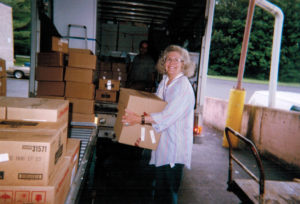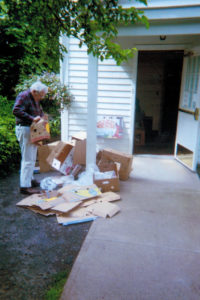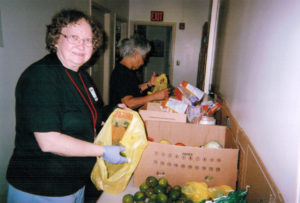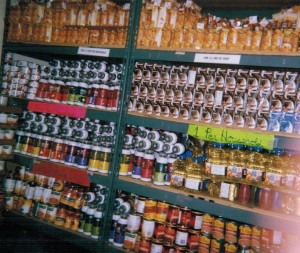A Holiday Gone Wrong
“When we talk cooking and eating, we are talking love, since the entire history of how a family loves – when and how they learned to love – can be told in most kitchens.” – Marion Roach Smith
The first year a person uses a food pantry for primary shopping, Christmas is a holiday gone wrong. After several years, Christmas becomes whatever the household can make of it. The adjustment is, for some, difficult and for others more difficult.
The difficulty lies, mostly, in the ability to get food items considered “traditional” by a household when no money is available to purchase them in a grocery store.
Once, I heard some pantry shoppers talking in the line about holidays past. Their conversation centered around people celebrating by eating too much delicious food and visiting with relatives, friends, neighbors while swapping stories, catching up on the news.
For more and more people living in poverty, this just doesn’t happen. Both households and individuals find themselves unable to finance the expense of the holiday event.
Not only can they not afford the food, more and more people no longer have the table to sit at, the chairs to sit on, and the stove to cook the food. Recipes, pots and pans, china, silverware, crystal are long since gone. Eating without a kitchen is the way of the modern household living on a minimum wage.
With luck, today’s struggling class household will have the gas to get the car to a soup kitchen. Otherwise, it’s going to be a regular day with a meal prepared in a crock pot, or on a hot plate. The economic situation for some is that just to take the day off and still be able to buy groceries the next day is more a goal than anything else.
Realities faced by the hungry pantry shopper weigh on my shoulders every day of the year. This weight keeps me squirreling away food so the pantry shelves can be stocked for celebrations with canned soup, canned gravy, potatoes, stuffing mix, canned green beans, cranberry sauce, chicken broth and all the fruits and vegetables that can be gotten at food drives and the food bank. Storeroom space and a few freezers at the food pantry are essential.
Pantry volunteers have a difficult time just keeping up with the ever increasing client census. Those with a stable shopper base, a large storeroom and connections can begin scrounging in July to set aside food. It’s extremely challenging to get several hundred or a thousand of an item in the summer and store the food until December.
After several years and several holidays, the food gatherer in the household becomes, if time allows, more skilled at scrounging for food in both the pantry and the grocery store. The difficulty lies, mostly, in the ability to get food items considered “traditional” by a household when no money is available to purchase the items in a supermarket.
While distributing food, I mentally predict who’s going to be successful at scrounging and gathering by the sound of the automobile as it’s driven into the parking lot of the pantry. A successful holiday dinner depends on a working automobile, time available between jobs, and the energy to sustain the search.
Transportation challenges, disabilities, and serious illness in the family can defeat all efforts.
Thank you for reading this article.
Please share this story with your preferred social media network.
Thurman Greco
Woodstock, NY
Book Update: “A Healer’s Handbook” has been published and is available on Nook and Kindle! It will be available in the paper version in early January. If you order it now, it will be mailed directly to you upon publication.
More information about this book can be found on Thurmangreco.com.
Publication of “The Unworthy Hungry” is now scheduled for January 2018.
Thank you for your support and your patience. Now that “Healer’s Handbook” has been published, there will be more frequent and regularly published articles on all blogs.
Thanks Again
The Face of Hunger/The Face of Hope
Every Monday, she brings her little granddaughter to the pantry –
Sue, maybe 4, is shy – absolutely beautiful – and still totally unaware of her situation:
White
Mother working 2+ jobs
Not enough to eat
Threadbare clothes
This lovely child takes pleasure in the smallest treats. Today her treat is a can of juice one of the volunteers found that’s not yet dented.
Her grandmother is teaching her to:
stand in line quietly
smile
say “thank you”.
How these mothers and grandmothers can get these little children to stand perfectly still and quiet for the time it takes to go through the line is completely beyond me.
But, back to the story.They get a 3-day supply of food which will last for 7 days, this struggling pair.
She’s always happy visit the pantry. It’s got 2 rooms so their next stop is the produce room where they have apples today.
Garrett and Susanne also keep the place well stocked with children’s books so there will be another treat for her.
When I see this pair, I see the universal grandmother and granddaughter next door. They are us. They are our neighbors. They are our cousins. I am reminded that we do not live in a we/they world. The hungry are us.
I’ve been working in a food pantry for years…certainly long enough to have become hardened to the reality and face of hunger. However, that is not what has happened. If anything, I’m more sensitive to the issues. I now truly believe that humans are not meant to suffer hunger and poverty. We are not meant to turn our heads away from the issue of hunger.
Most poor families in America are working families. The low wages earned by the millions of hungry Americans are not enough to cover the cost of housing, medical care, child care, transportation, clothing and food.
As the Struggling Class begins cutting food because the budget no longer allows it, they begin by cutting out meat. If that is not enough, they go to the second level and cut out meat, vegetables and eat eat only cereals.
Finally, it means cutting out an entire meal every day.
Food Pantries offer the hope of at least not starving to death. When people visit food pantries they can get food which they otherwise could not purchase. This brings hope to us all – not only the hungry but to those who work to appease the situation.
http://www.allianceforpositivehealth.org
http://www.foodbankofhudsonvalley.org
Thank you for reading this blog/book.
Please refer this article to your preferred social media network.
Thurman Greco










